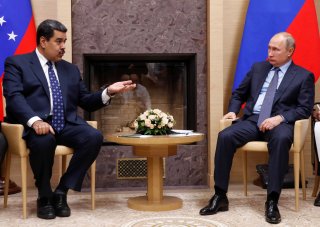How Russia Militarizes Authoritarianism in Latin America
Russia’s multi-dimensional strategy in Venezuela, Nicaragua, and Cuba incorporates a broad spectrum of strategic activities to reinforce a geopolitical leverage point.
Ortega and Putin refer to their partnership as “strategic cooperation.” In 2017, Russia donated a satellite station to Nicaragua and some speculated that the site would be used as a spy facility, despite Nicaraguan officials saying it will be used within Russia’s global navigation satellite system (GLONASS). The station is operated in Managua by the Russian Space Agency, Roscosmos, and the Russian diplomatic mission has administrative control; Nicaragua only provided the land. Russia claims that the facility is used to monitor Russian satellites for civilian use, but it appears to be equipped with antennae that can intercept a range of radio frequencies and be used for domestic surveillance. The site is linked with twenty-four Russian satellites, five of which could send continuous information to Nicaragua. It could also intercept Internet traffic on the ARCOS 1 fiber-optic cable that runs from Miami to Central America.
Conclusion
Russia’s multi-dimensional strategy in Venezuela, Nicaragua, and Cuba incorporates a broad spectrum of strategic activities and it is currently expanding its influence through weapon sales and other low-profile activities, including disinformation, and strengthening its position in Latin America.
Moreover, Latin America is undergoing a shift to the Left, which opens the door for Russia to offer an alternative. It also limits U.S. leverage in bilateral security cooperation and multilateral forums to apply pressure on these regimes. Potential Russian partners include president-elect Xiomara Castro’s Libre Party in Honduras, particularly after the Honduran president just awarded Ortega with a prize for democracy, and President Gabriel Boric in Chile, given that the Chilean Communist Party is part of his coalition.
Caroline C. Cowen is an international strategic consultant and specialist that has worked on topics relating to development, defense, and democracy with the Inter-American Dialogue, Duco, and Expediente Abierto. As a consultant, she has worked with leaders within Nicaraguan civil and political organizations and the Nicaraguan diaspora to convene on issues pertaining to political and democratic reforms. Previously, she worked extensively on development issues in Latin America for Freedom House.
Image: Reuters.

